Watch out!
Stand back! He has a banana!
Royal decrees; interesting things I find; photographs I've taken; random thoughts on politics and culture as I know 'em; holidays both real and imaginary; and a fantasy novel page-by-page. "I hate hippies." -- Alicia Spanhake, Honorary Baroness of Síporozorígí |
In Washington, the Columbia River is crossable by car in 25 locations, including three ferries. 21 of those crossings are Washington state highways (US 101, SR 433, I-5, I-205, US 197, US 97, I-82, SR 397, US 395, I-182, SR 24, I-90, SR 285, US 2 [also signed US 97], US 97, SR 173, SR 17, SR 155, SR 21 [ferry], SR 20 [& US 395], SR 25).
Curiously (at least for me), the only US Routes and Interstates in Washington that don't cross the Columbia are I-405, I-705, US 195, US 730, and US 12 (technically, but it is signed crossing the river concurrent with I-182).
The other four river crossings are the Bridge of the Gods (near Stevenson), the Hood River Bridge (near White Salmon), the Wahkiakum County Ferry (near Cathlamet), and the Gifford-Inchelium Ferry (near Inchelium).
I've walked across the Bridge of the Gods as part of the Pacific Crest Trail. The bridge was built in the 1920s by a private toll company and named after a geological event. It's still a toll bridge (for vehicles -- no charge for pedestrians).
The Washington legislature told the DOT (via a new law in 1997) to build a new bridge near the Hood River Bridge (and call it SR 35), but that hasn't happened yet. The Hood River Bridge was constructed in the 1920s and its operated as a toll bridge by the Port of Hood River. They don't allow pedestrians.
The Wahkiakum County Ferry is operated by Wahkiakum County. It sails from the end of SR 409 across the river to US 30 in Oregon, every hour.
The Gifford-Inchelium Ferry is operated by the Colville Tribes. They don't charge anything for this trip across Roosevelt Lake.
The Columbia River has other crossings (railroads, dams, and a pedestrian bridge), but you're not allowed to drive over those. Here's a list.
Posted by Sotosoroto at 15:20 0 comments
Index: driving, washington
The Northgate Washington Mutual sign is lying on the ground, removed by the new owners. I presume a grand Chase sign will be erected in its place.
Or maybe not. They took down the post, too.
Posted by Sotosoroto at 18:03 0 comments
The time is now for doing. Go do something.
Posted by Sotosoroto at 14:38 0 comments

Happy Holy Day of Sorosotuzho to you! He is the God of the Atmosphere, floating above us all and passing judgment on our every movement.
He used to be the King of the Gods and Ruler of the Universe . . . but His insolent son Korutuzho castrated Him. You know how that goes, right?

Far above us, far above the tallest mountains, far above the farthest reaches of your imagination, floats the heavenly air of the gods. This air is Sorosotuzho, Who watches over all, casting His judgment upon mortals below. Sorosotuzho is the atmosphere that no mortal can touch. Sorosotuzho is the heavenly light, of which only a small portion filters down to us on the earth. Sorosotuzho is the soul of the world, the beginning and end of all life in the universe, the source of everything.
Every evening, Sorosotuzho hides His glorious light by descending to the earth, Who is His mother Kara, Goddess of Soil. Every night, as darkness encompasses the world, They lie together and produce life. Their children are countless: hundred-limbed giants, one-eyed demigods, and numerous gods.
Chief among His children were Korutuzho, God of Agriculture, and Zhaké, God of Rivers, although neither controlled those aspects originally. They were merely gods with nothing to do but live as They saw fit. The remainder of the gods and giants had even fewer responsibilities, so they lived life to the fullest, carousing and battling however their instincts led them.
All these new gods and giants, however, disrupted the quiet life of the Eldest of all the gods, Kérasa, High Goddess of Water. Kérasa, being the Eldest, held the Tablet of Destinies, which proclaimed Her to be the Ruler of the Universe. The noise of the new gods drove Kérasa insane. Lacking reason, She waged war upon the new gods, using Her position as Ruler of the Universe to call hordes of demons and dragons to Her side. Sorosotuzho fought valiantly at the head of His army of light, defending the gods and giants He had created. The war lasted for years and Cycles.
The day came, however, when Sorosotuzho and the gods of light prevailed. Kérasa and Her evil were defeated. Zhoro, God of Heat and a triumphant warrior, killed Her chief dragon and obtained the Tablet of Destinies. Rather than keep it for Himself, though, Zhoro recognized Sorosotuzho as the strongest of the gods of light. Zhoro presented the tablet to Sorosotuzho, Who held it aloft for all to see. Sorosotuzho was now the Ruler of the Universe and King of the Gods, shining His magnificent radiance upon all in the world, whether god or mortal.
Sorosotuzho returned to the upper atmosphere to observe all His realm. Upon His head as a crown, He grew a pair of bull horns, each a mile long. He was the Ruler of the Universe, the source of all goodness and light in the world, and the distributor of judgment for everyone in His domain.
His sons, though, were causing quite a ruckus still. Sorosotuzho decided that They required responsibilities, or else They might destroy the universe He worked so hard to maintain. Disguising His intentions with a game of chance, Sorosotuzho challenged Korutuzho and Zhaké to rolls of the dice. They, having nothing to do all day but drink, fight, fornicate, and gamble, gladly accepted.
By placing the dominion of the oceans as the prize for one roll, Sorosotuzho granted all the seas to His son Zhaké. Upon the next roll, He wagered control of the land. Korutuzho won the game, taking all earth into His power. The two young gods were thrilled to have beaten Their father at dice that it wasn’t until the next day that They realized They now had significant responsibilities to manage and maintain aspects of the universe. At first, They were angry with Their father, but He scolded Them and They agreed to buckle down and take control of Their new kingdoms.
For many years, everything went swimmingly. The young gods settled down and the universe prospered. Sorosotuzho floated over all in the upper atmosphere, ruling the world from far above, seeing and judging all.
One day, however, Korutuzho attempted to steal the Tablet of Destinies. He had grown tired of controlling merely the earth and desired control over the entire universe. When Korutuzho arrived at Sorosotuzho’s throne room, though, He found that the Tablet of Destinies was no longer there. Sorosotuzho had hidden it, knowing of His son’s ambition to overthrow Him. Korutuzho tried to talk His way out of the situation, but Sorosotuzho did not listen to His lies. The King of the Gods hooked His son with His bull horns and threw Him deep into the Underworld, imprisoning Korutuzho for His insolence.
Even with Korutuzho locked away, Sorosotuzho worried. Would His other children plot against Him as well? Were They scheming that very minute? He had not a moment to lose, lest They all attack Him together. One by one, Sorosotuzho captured every god, giant, and demigod He had sired, jailing Them alongside Korutuzho deep within the earth. Only once They were all imprisoned did Sorosotuzho relax.
That was not the time to lower His guard, however. The goddess Kara, Who was the very earth imprisoning the gods and giants, took pity on Her children. She felt Her son, Sorosotuzho, had overstepped Himself and was no longer fit to rule. Kara offered a sickle to all of Her imprisoned children, asking One of Them to rise from the earth and turn the bull into a steer.
Korutuzho leapt forward, eager to oblige. He grabbed the sickle and climbed up through His earth, His mother, to confront His father once more. Sorosotuzho had been relaxing above the clouds, satisfied that His position was secure, when suddenly His son broke into view, waving the sickle over His head. Sorosotuzho tried to spin to gore Korutuzho with His horns, but the young god was quicker. With a deft stroke of the sickle, the earth god castrated His father, rendering Him powerless. In agony, Sorosotuzho retreated to the far reaches of the atmosphere, abandoning the Tablet of Destinies for Korutuzho to claim.
While Korutuzho released His siblings from the Underworld and held the tablet aloft for all to see, Sorosotuzho nursed His wounds and plotted revenge. The universe was rightly His; without Sorosotuzho’s gift of responsibility, Korutuzho would still be drinking and carousing without the slightest ambition. The universe would fall to anarchy under Korutuzho’s reign. The universe needed Sorosotuzho’s sage judgment and care. He was the light of the universe, the source of all life, and the air of the gods, after all.
In the midst of Korutuzho’s celebratory party, Sorosotuzho swept upon His son and challenged Him to an honest duel. All the gods backed away from the two, giving Them space, except for one. Zhoro, Who had placed the Tablet of Destinies into Sorosotuzho’s hands so many years before, now stood at Korutuzho’s side. Sorosotuzho demanded to know the reason for this betrayal. Unsheathing His sword, Zhoro informed the air god that Korutuzho was now the rightful King of the Gods and Ruler of the Universe.
Enraged, Sorosotuzho swiped at the two gods with His horns, but They proved too nimble for His attack. As Korutuzho backed away, Zhoro stepped between Sorosotuzho’s horns and sliced His sword through Sorosotuzho’s chest. The air god fell to the ground, defeated, whereupon Zhoro proceeded to hack His body into infinite pieces. Sorosotuzho was no more. Korutuzho ruled the universe.
Sorosotuzho’s essence lived on, however. Day by day, His soul collected itself in the upper atmosphere. Slowly and deliberately, Sorosotuzho reformed without body as the great bronze dome that is the sky far above us. He is the heavenly light of which only a small part filters down to earth. He is the air which the gods breathe. From above, He watches everyone -- mortals and deities alike -- and casts His judgments upon all. Sorosotuzho is the source of all life in the universe and the soul of the world, as He shall be for all time.
The landscapers for the construction across the street are finishing up their work. Their industrial-sized bark blower has been running all day. It's very noisy. It's very irritating.
Aaaaarrrrgggghhhhhh!!!!!!!
Posted by Sotosoroto at 16:11 0 comments
Index: construction, northgate
Boom! goes the volcano, twenty-nine years ago today.
You'll be prepared next time, won't you? It's Mount Rainier's turn, I think.
. . . And by the way, never spell out the "St." It was part of someone's name, and that's how his family always spelt it.
Posted by Sotosoroto at 06:00 0 comments
Index: geology, history, holidays, language, washington
Don't take ibuprofen on an empty stomach. Don't even take ibuprofen on 16 fluid ounces of water.
Nausea, nausea, nausea, puke.
Posted by Sotosoroto at 21:04 3 comments
Are you in the San Juans? We are. It's very nice here!
... I tried to upload a photo, but I guess the connection is too slow. For shame, for shame. You'll just have to wait to see how nice it is.
Posted by Sotosoroto at 14:20 0 comments
Index: travel, washington
Why do the "WET MUD" signs on the wall remind me of the song "Sixteen Tons"?
Is there some other similar song that I'm forgetting?
. . . By the way, the "mud" signs refer to patches of plaster.
Posted by Sotosoroto at 09:08 1 comments
Index: construction, random, songs

Today is the Holy Day of Sívorí, Goddess of Stars, the wisest goddess of all. She invented writing, speech, dance, music, science, arts, etc. etc. etc. She also controls time, so let's all give four cheers for Sívorí!
Hurrah! Hurrah! Hurrah! Hurrah!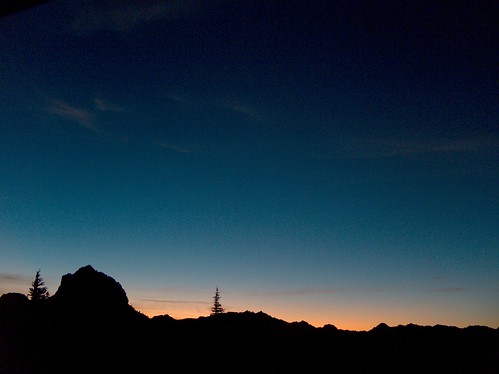

Each and every evening, Sívorí coaxes Her brother Néhété, God of Smoke and Darkness, out from the Underworld to push back the haze of daytime and let Her stars shine for all to see. While Néhété and all the world watch, Sívorí dances to music of Her own creation, causing the stars to spin in the sky, the planets and comets to skirt to and fro, and every particle in the universe to keep to its function. To change a planet’s direction or modify time itself, Sívorí merely varies Her dance in the slightest manner. The universe is under Her absolute control.
Long before human beings were created, Sorosotuzho, God of the Atmosphere, was King of the Gods and Ruler of the Universe, and that was how Sívorí wanted it to be. Sorosotuzho took the fame and glory, strutting about the universe and being completely ineffectual, while Sívorí kept dancing and actually controlled everything in existence.
Every night while She danced, Sívorí would have lengthy conversations with Her brother, Néhété. He would ask the most imaginative questions, such as why do trees grow up instead of down, and Sívorí would give patient and rational answers, for She is the most wise of all the gods. If, for some reason, She did not immediately know the answer to a question, Sívorí would consider the subject until She did know the answer. It was in this manner that Sívorí invented dance, music, song, painting, science, astronomy, writing, and speech itself. When Sorosotuzho needed to make a pronouncement to all the universe, He would ask Sívorí to do it, for She had infinite control of words and their understanding.
When Sívorí invented writing, it was so She could share Her expansive knowledge with others. The most pressing issue was the fact that souls were arriving at the Underworld to be judged for the afterlife, without knowing the slightest bit about how they should have lived their lives to achieve favorable reincarnation. Sívorí then sat down and penned the Book of the Dead, which explains in great detail that every being in the universe should treat each other with respect, help himself by providing for his fellow beings, and help others by providing for himself. She further included information on what to expect in the Underworld: penetrating questions by Néhété, concise judgment by Sívorí, and a pleasant afterlife and high-quality reincarnation for those whose souls deserve it -- or a painful, lengthy afterlife and a lowly reincarnation for those whose soul deserve that. Sívorí would continue dancing in the heavens while She sat in judgment in the Underworld, for She is a magnificent goddess Who can be everywhere at once, if it so pleases Her.
At a certain point in Sorosotuzho’s reign, when all was good, calm, and peaceful in the universe, His wild son Korutuzho, God of Agriculture, challenged Sorosotuzho for the title of King of the Gods. Sívorí did not mind Who held the title so long as She remained in control, but She did loathe the chaos and upheaval that would follow a regime change.
Korutuzho drew His sword and pointed it at Sorosotuzho’s chest. Sorosotuzho rose from His throne and drew His own sword. The two gods exchanged blows, sparks flying from Their clashing blades. Korutuzho drew blood first, with a vicious strike to His father’s upper arm. Sorosotuzho retreated a few steps from His son; Sívorí dashed to Sorosotuzho and healed His wound with a pass of Her hand. The King of the Gods then lunged at His son, resuming the fight. Next to draw blood was Sorosotuzho, with a precision stab to Korutuzho’s thigh. The challenger backed away from His father; Sívorí dashed to Korutuzho’s side and healed His wound with a pass of Her hand. She did not want Korutuzho to die, either, for that would upset the balance nearly as much as the dethroning of Sorosotuzho.
The battle raged on for years, neither god gaining the upper hand because Sívorí would heal all injuries. The fight had to end, however, for it was causing as much instability in the universe as a change in kings could ever do. Watching the fight, it was quite apparent to the goddess that Korutuzho was by far the stronger swordsman. Without Her interference, Sorosotuzho would lose. Thus Sívorí sized up Korutuzho, deemed Him to be as good a god as His father, and let Him win.
Upon gaining the throne, Korutuzho claimed as His own the sun, taking it from Sorosotuzho, and the sun’s innermost planet, taking it from Sívorí. She let it go willingly, for She still controlled its movement despite Korutuzho’s essence intertwined with the stellar body. Furthermore, Korutuzho took the moon from Sorosotuzho and gave it to His sister Ríhíví, Goddess of Hot Springs; the star of evening and morning, brightest in the sky, He took from Sívorí and gave to His wife Rana, Goddess of Clouds; He took the red planet from Sívorí and gave it to Rana’s brother Rékaré, God of Rock; and the bright, slow planet Sozho took from Sívorí and gave to His own brother Zhaké, God of Rivers. The only planet still associated with Sívorí directly was the outermost planet, the keeper of time. None of these changes upset Sívorí; She kept dancing and the universe kept turning.
Adding to Her Book of the Dead, Sívorí recorded all the new information on the gods and Their planets. She described how best to worship each god and wrote down all knowledge of Them. Every god provided suggestions; Sívorí organized the information and documented everything.
Throughout it all, Sívorí continued to dance the universe in motion. She and Her brother continued to judge souls upon entrance to the Underworld. She continued to coax Néhété to hide Korutuzho’s light and let Her stars shine through. Néhété continued to ask questions and Sívorí continued to answer all and invent wondrous new things. Korutuzho was King of the Gods and Ruler of the Universe, and that was how Sívorí wanted it to be. Korutuzho took the fame and glory, strutting about the universe and being completely ineffectual, while Sívorí kept dancing and actually controlled everything in existence.
At a certain point in Korutuzho’s reign, when all was good, calm, and peaceful in the universe, His wild son Sozho, High God of Air, challenged Korutuzho for the title of King of the Gods. Once again, Sívorí did not mind Who held the title so long as She remained in control, but She did loathe the chaos and upheaval that would follow a change of regime.
Sozho drew His sword and pointed it at Korutuzho’s chest. Korutuzho rose from His throne and drew His own sword. The two gods exchanged blows, sparks flying from Their clashing blades. Sozho drew first blood, with a vicious strike to His father’s upper arm. Korutuzho retreated a few steps; Sívorí dashed to the king and healed His wound with a pass of Her hand. Korutuzho then lunged at His son, resuming the fight, and soon drew blood Himself with a precision stab to Sozho’s thigh. The challenger backed away from His father; Sívorí dashed to Sozho’s side and healed His wound with a pass of Her hand. She did not want Sozho to die, either, for that would upset the balance of the universe nearly as much as the dethroning of Korutuzho.
The battle raged on for years, neither god gaining the upper hand because Sívorí would heal all injuries. The fight had to end, however, for it was causing as much instability as a change in kings could ever do. Watching the fight, it was quite apparent to the goddess that Sozho was the stronger swordsman. Without Her interference, Korutuzho would lose. Thus Sívorí sized up Sozho, deemed Him to be as good a god as His father, and let Him win.
Upon gaining the throne, Sozho claimed as His own the sun, taking it from Korutuzho, and the bright, slow planet, taking it from Zhaké. Furthermore, Sozho took the moon from Ríhíví and the brightest planet from Rana and gave them to His wife Nuvíní, High Goddess of Earth; Sozho took the sun’s innermost planet from His father and granted it to His brother Pétíso, God of Death; the red planet He took from Rékaré and gave it to His brother Voro, God of Hearth Fire; and the outermost planet He took from Sívorí and gave to His brother Vasataté, God of Oceans. Sívorí was now left with nothing but the stars in Her name, but this did not upset Sívorí; She kept dancing and the universe kept turning.
Sívorí updated the Book of the Dead, recording all the new information on the gods and Their planets. Every god provided suggestions; Sívorí organized the information and documented everything.
In the Underworld, Pétíso attained the role of judge of the dead, superseding Sívorí and Néhété. Unlike Sozho, however, Pétíso still relied heavily upon the deposed elder gods’ advice. Néhété continued to question souls upon their arrival to the Underworld; Sívorí continued to dispense sage counsel for Pétíso to absorb and incorporate into His own decisions.
Throughout it all, Sívorí continued to dance the universe in motion. She continued to coax Néhété out from the Underworld to hide Sozho’s light and let Her stars shine through. Néhété continued to ask questions and Sívorí continued to answer all and invent wondrous new things. Sozho was King of the Gods and Ruler of the Universe, and that was how Sívorí wanted it to be. Sozho took the fame and glory, strutting about the universe and being completely ineffectual, while Sívorí kept dancing and actually controlled everything in existence.
At a certain point in Sozho’s reign, when all was good, calm, and peaceful in the universe, Pétíso’s wild son Huro, God of Thunder, challenged Sozho for the title of King of the Gods. Sívorí did not mind Who held the title, but She did loathe the chaos and upheaval this battle would generate.
Huro hefted His hammer and pointed it at Sozho’s chest. Sozho rose from His throne and drew His sword. The two gods exchanged strikes, dodging each other’s slashing weapons. Huro connected first, with a vicious hit that broke His uncle’s upper arm. Sozho retreated a few steps from His nephew; Sívorí dashed to Sozho and healed His injury with a pass of Her hand. The King of the Gods then lunged at His nephew, resuming the fight with a precision stab to Huro’s thigh. The challenger backed away from His uncle; Sívorí dashed to Huro’s side and healed His wound with a pass of Her hand. She did not want Huro to die, either, for that would upset the balance nearly as much as the dethroning of Sozho.
The battle raged on for days, neither god gaining the upper hand because Sívorí would heal all injuries. The fight had to end, however, for it would cause as much instability in the universe as a change in kings could ever do. Watching the fight, it was quite apparent to the goddess that Sozho was by far the stronger combatant. Without Her interference, Huro would lose. Sívorí sized up Huro, deemed Him to be unfit to rule, and thus let Sozho win, retaining the throne.
After deposing the young upstart, Sozho was ecstatic in His show of power, but Sívorí reminded Him Who actually controlled the universe and suggested to the king that perhaps He should delegate some responsibilities to appease the younger generation. Sozho acquiesced, granting the sun to His son Píríuso, God of the Sun, and the bright, slow planet to Rakazhazhíní, Goddess of Clean Air. Furthermore, Sozho had His wife Nuvíní give the moon to Sozho’s daughter Tarénara, Goddess of Hunting, and the star of evening and morning, brightest in the sky, to Their daughter Vuzhí, Goddess of Life. As consolation for failing to wrest the throne from Sozho, Pétíso gave the sun’s innermost planet to His son Huro. Meanwhile, Voro gave His red planet to His high god Zhíanoso, High God of Fire, Who after a few years delegated it to His daughter Rívorí, Goddess of Wildfire. Similarly, Vasataté gave the furthest planet to His high goddess Kérasa, High Goddess of Water, Who after a few years delegated it to Her grandson Zhaké. Thus the planets are now named in accordance with their ownership.
Sívorí updated the Book of the Dead, documenting all the new information on the gods and Their planets.
Throughout it all, She continues to coax Néhété from the Underworld to hide Píríuso’s light and let Her stars shine through. Sívorí and Néhété continue to aid Pétíso’s judgment of the dead. Néhété continues to ask questions and Sívorí continues to answer all and invent wondrous new things. Sozho is King of the Gods and Ruler of the Universe, and that is how Sívorí wants it to be. Sozho has the fame and glory, while Sívorí keeps dancing the universe in motion, in control of all.
I discovered that when you accidentally plug the cable from the DSL modem into an LAN port on the wireless router instead of the internet port, computers accessing the network wirelessly can no longer get on the internet, but computers accessing by a hard line can still get out -- but slowly.
Posted by Sotosoroto at 11:39 2 comments
Lumberwolf: a domesticated timberwolf (well-hewn!)
Posted by Sotosoroto at 14:49 0 comments
This weekend, I didn't do anything terribly photo-worthy (vacuum house, water plants, lunch with in-laws, lunch with mother, run, study Chinese, mow lawn, weed, fix rental house stairs, file bills, shred bills, order fridge parts, relocate website from Geocities to Webs, and upload last weekend's photos onto Flickr), but the previous weekend, we drove a huge loop across the state that warranted uploading photos onto Flickr (also Flickr).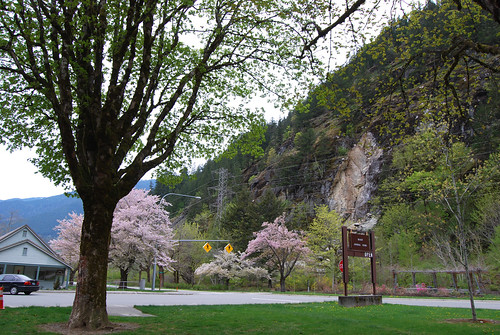
We stopped in Newhalem for a picnic lunch. A pleasant meal under the trees. The contant bell-ringing by kids on the nearby locomotive was a bit distracting, however.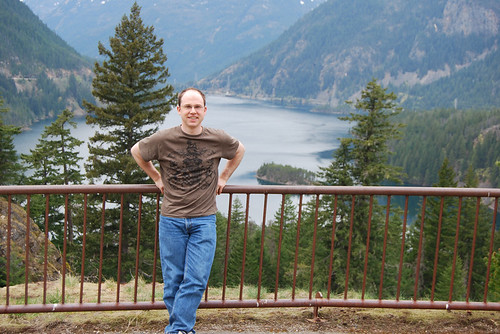
And then we had to stop at the Diablo Lake overlook, as must everyone.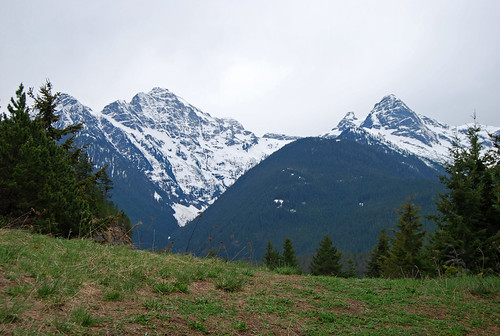
Lovely mountains abound.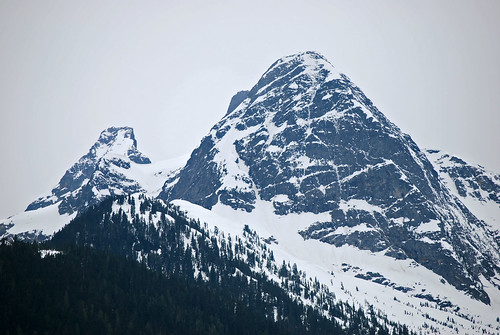
Zoooom!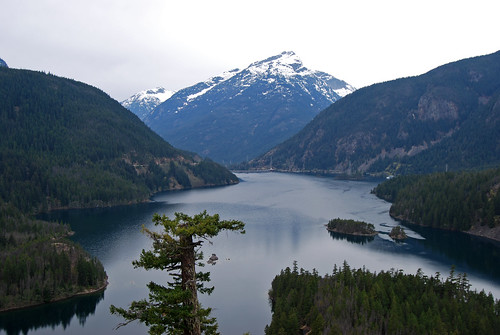
I'm used to Diablo Lake being very green from glacial run-off, but I guess early in the year, the snowfield run-off dominates the flow and the lake's plain blue.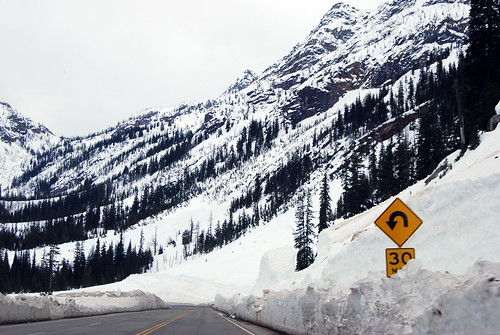
Up over Washington Pass, through the avalanche chutes. Still plenty of snow piled around.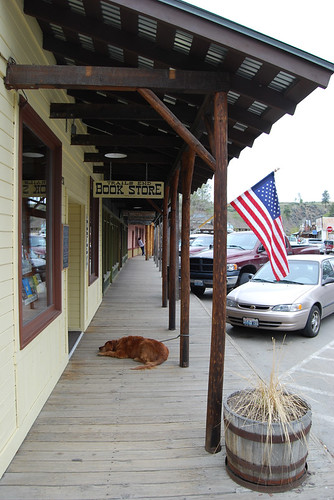
We stopped for a bit in popular Winthrop, home of the wooden sidewalks. All we bought was an ice cream cone, however.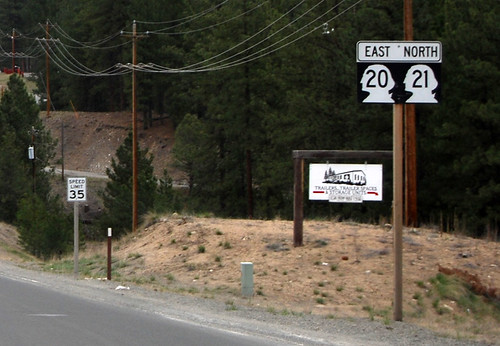
Near Republic, highways 20 and 21 overlap. This is fairly unusual in Washington, except for the U.S. Routes which often overlay interstates and each other. 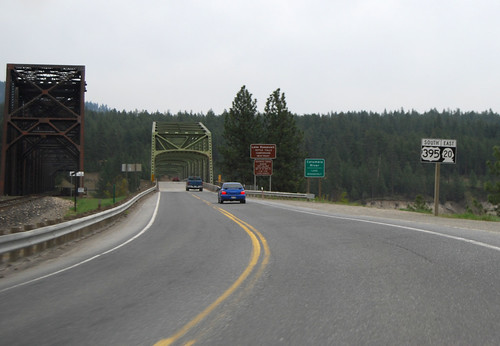
Or like here, where 395 overlaps 20. We're just about to cross the Columbia River (Lake Roosevelt here) at Kettle Falls (the falls are now under the lake). In many ways, SR 20 is like a U.S. Route, in that various bits of existing highway (and a couple new stretchs) were assigned a number to make a unified route. To make the northernmost cross-state highway, the state had to include many stretches of "eastbound 20" that were actually north or south, or in extreme cases, west. Is it thus any wonder that SR 20 is the longest highway in the state, even though it doesn't go all the way to the Pacific?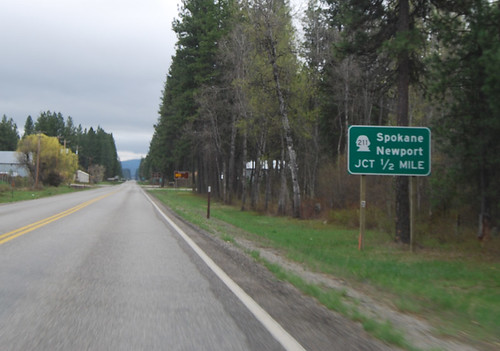
An oddity northwest of Newport. This sign would imply that you should take SR 211 to get to Newport, when rather you should keep going straight. I hope not many get confused.
Ponderay in Pend Oreille! I blame the French, for not knowing how to properly pronounce their own language. Also: why do we call it newsprint when it has neither news nor print? Shouldn't it be called paper or, perhaps, newspaper? And then call newspaper newsprint, because it actually has words printed on it? . . . I blame the French.
Posted by Sotosoroto at 11:58 0 comments
Index: driving, geology, language, photos, washington
Posted by Sotosoroto at 08:26 0 comments
Index: government, justice, tv
We're finally finishing Highway 20! While I feared circumstances that may prevent such a journey, the circumstances worked in my favor this time -- at least as it regards having the time to take a long drive. Plenty of yardwork yesterday evening, though. . .
Impressive cuts through the avalanches up at Washington Pass. You could see trees sticking out of the massive snow piles. I didn't expect that. But avalanches carry away everything in their paths, don't they?
Highway 20 is a very mountainous, curvy road. Fun to drive, but the trees and canyons started getting on Chunlin's nerves. She wanted views and open spaces. We got a few of those in the Methow Valley and here in the Colville area, but certainly not many.
A lot of old forest fires and swamps up here in northern Washington, too. . .
Posted by Sotosoroto at 20:09 0 comments
Index: driving, washington
When I flip over my calendar at work, I'm presented with this lovely photo of my lovely wife, from a kayaking day trip in south Puget Sound last spring.
Smile!
Paddle paddle paddle paddle paddle paddle . . . Can I get out now? Paddle paddle paddle paddle paddle . . . Not yet.
Posted by Sotosoroto at 07:42 0 comments
I'm now at my lowest weight in the past three years, fourteen stones!
I guess exercise *does* help.
Time to celebrate with a donut.
Posted by Sotosoroto at 07:38 0 comments

California Roadtrip, Summer 2006

Light Rail Neighborhood Density
The World Does Not Agree with You
Failure Should Never Be Rewarded
Thoughts on Illegal Immigration
I'm a Native American, Dammit!
More "Global Warming" Skepticism
Giant Solar System Model along I-90
Restaurant at the End of the Universe Movie Idea